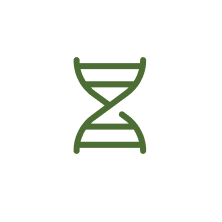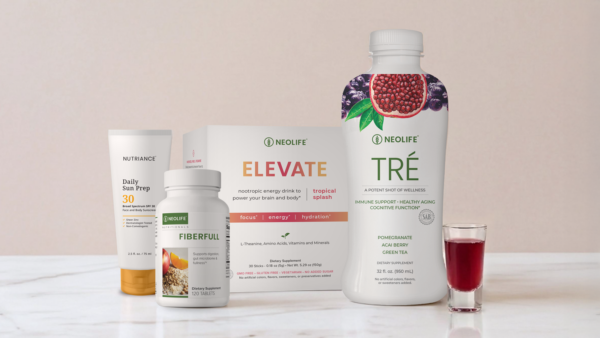As our entire sense of self — our thoughts, actions, and feelings — originate from the brain and actions of neurons, it’s clearly important to do what we can to support a healthy brain and normal neurotransmitter function. One crucial component for maintaining cognitive health, as well as overall healthy aging, is a well-balanced and diverse diet.
What elements of a healthy diet are most important for supporting brain and cognitive health? There are numerous nutrients involved, but let’s take a deeper look at a couple shown to be particularly influential in supporting a healthy brain and normal neurotransmitter function.
Flavonoids
Flavonoids are a category of polyphenolic compounds with numerous effects on cognition and behavior through a variety of mechanisms, including neurotransmitters. Researchers have proposed that some flavonoids act to increase acetylcholine and serotonin levels and others impact the GABA and glutamate systems.2 Flavonoids have a protective effect and have been found to positively impact memory, learning, and mood. Some of the richest sources of flavonoids are tea, fruits (especially berries and citrus), legumes, and kale.
Folate
Folate is essential for proper brain development and function. Folate is necessary for the proper synthesis of neurotransmitters: serotonin, dopamine, and epinephrine.3 Inadequate levels of folate have been associated with depression and cognitive impairment.3,4 Good sources of folate include dark leafy greens, legumes, nuts, and eggs. Folate and folic acid are terms often used interchangeably, but folic acid is the form of folate commonly found in fortified foods and dietary supplements and is actually more bioavailable than folate found in foods.4 The folate Daily Value (DV) for healthy adults is 400 mcg of Dietary Folate Equivalents (DFEs), which is equivalent to 240 mcg of folic acid. However, since folate is so important for proper brain development, the DV for pregnant women is 600 mcg DFE and 500 mcg DFE for women who are breastfeeding.
Vitamin B6
Vitamin B6 is involved in over 140 coenzymatic functions but is particularly known for its role in synthesizing neurotransmitters like dopamine, serotonin, and GABA.5 It helps regulate communication between neurons by influencing GABA and glutamate levels, keeping neuronal activity balanced.1,5 Sources of vitamin B6 include fish like salmon and tuna, poultry, and beef liver. The DV for vitamin B6 is 1.7 mg, though the recommendation for pregnant and lactating women goes up to 1.9 mg and 2.0 mg, respectively.
Vitamin B12
Vitamin B12 is known for its roles in energy production, DNA synthesis, and red blood cell formation. It also helps neurons maintain their myelin sheath (Fig 1 on previous page), which is critical for normal nerve signal transmission.15 Vitamin B12 is naturally present primarily in animal products including meat, seafood, eggs, and dairy. For this reason, vegetarians and vegans are more susceptible to suboptimal vitamin B12 levels. Vitamin B12 deficiency is also more common among the elderly due to declining absorption. Eating fortified foods or using supplements can help people meet the 2.4 mcg DV (2.6 mcg for pregnant and 2.8 mcg for lactating women).
B vitamins are clearly important to proper brain functioning, and restoring adequate nutrient status by supplementing with folic acid, both by itself and with other B vitamins, have been shown to be effective in helping reduce age-related cognitive decline.4 In fact, several studies indicate that supplementing with a combination of vitamin B6, B12, and folic acid act synergistically to improve motor control and help reduce occasional anxiety and stress-related conditions.15
Vitamin D
Vitamin D plays a vital role in early life neuronal development and continues to be necessary to protect the adult brain.6 There are numerous vitamin D receptors throughout the brain and vitamin D helps regulate calcium homeostasis and causes changes in neurotransmitters like glutamate, dopamine, and serotonin. Vitamin D deficiency has been linked to numerous problems like cognitive impairment and depression.6 Though our bodies synthesize vitamin D when our skin is exposed to sunlight, the amount we can produce decreases with age, meaning older populations are at higher risk of vitamin D deficiency. The DV for vitamin D is 20 mcg. Most dietary sources of vitamin D are from animal sources including fatty fish like salmon and tuna, egg yolks, and cheese, though some is found in certain mushrooms.
Omega-3 Fatty Acids
The human brain is about 50–60% lipids, of which 35% are omega-3 polyunsaturated fatty acids.7 Omega-3s support neuronal preservation, promote cognition, and help protect against neurodegeneration.5 Omega-3 deficiency has been linked with increased risk for cognitive decline, depression, inattention or difficulty focusing, and other challenges.4 Omega-3s are essential fatty acids, meaning our bodies cannot manufacture them, so they need to be obtained through diet. Many studies have shown that omega-3 supplementation can have cognitive benefits, including improved learning, better memory, and increased neurotransmitter release.4,7
Choline
Acetylcholine is a prominent excitatory neurotransmitter in the brain, playing roles in muscle function, memory, and attention.6 Synthesizing acetylcholine requires an essential nutrient called choline. Our bodies can produce some choline, but not adequate amounts, so more needs to be obtained from the diet. Eggs, cruciferous vegetables, peanuts, and liver are particularly rich sources of choline. The DV for choline is 550 mg, but a 2015–2018 National Health and Nutrition Examination Survey found the average US daily intake was only 284 mg for women and 390 mg for men.8 Only 6% of women and 11% of men consumed enough choline to exceed the Adequate Intake.
Access the full article in the digital News You Can Use:
References:
- Gasmi A, et al. Neurotransmitters regulation and food intake: The role of dietary sources in neurotransmission. Molecules. 2022 Dec; 28(1): 210. doi: 10.3390/molecules28010210.
- Bakoyiannis I, et al. Phytochemicals and cognitive health: Are flavonoids doing the trick? Biomed Pharmacother. 2019 Jan; 109: 1488-97. doi: 10.1016/j.biopha.2018.10.086.
- Miller AL. The methylation, neurotransmitter, and antioxidant connections between folate and depression. Altern Med Rev. 2008 Sep; 13(3): 216-26. PMID: 18950248.
- Gomez-Pinilla F. Brain foods: The effects of nutrients on brain function. Nat Rev Neurosci. 2008 Jul; 9(7): 568-78. doi:10.1038/nrn2421.
- Calderon-Ospina CA, Nava-Mesa MO. B Vitamins in the nervous system: Current knowledge of the biochemical modes of action and synergies of thiamine, pyridoxine, and cobalamin. CNS Neurosci Ther. 2020 Jan; 26(1): 5-13. doi: 10.1111/cns.13207.
- Anjum I, et al. The role of vitamin D in brain health: A mini literature review. Cureus. 2018 Jul; 10(7): e2960. doi: 10.7759/cureus.2960.
- Dighriri IM, et al. Effects of omega-3 polyunsaturated fatty acids on brain functions: A systematic review. Cureus. 2022 Oct; 14(10): e30091. doi: 10.7759/cureus.30091.
- Choline. Oregon State University. Updated April 2023. Accessed Aug 7, 2023. https://lpi.oregonstate.edu/mic/other-nutrients/choline#food-sources.

















